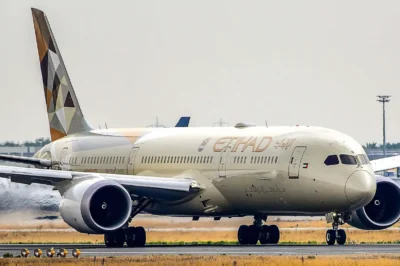Etihad Airways, based in Abu Dhabi, has issued a safety alert to its pilots regarding the operation of fuel control switches on Boeing 787 aircraft. Dated July 12, the bulletin instructs pilots to exercise extra caution to prevent accidental activation of these switches by avoiding objects on the pedestal. It also mandates that crews report any irregularities promptly and calls for a swift inspection of all Boeing 787 planes in their fleet.
This directive was issued after the results of the Indian Air Accidents Investigation Bureau (AAIB) investigation into the crash of Air India Flight 171 revealed that the aircraft’s two engine fuel control switches were switched from the “RUN” position to the “CUTOFF” position seconds after takeoff. Audio from the Air India cockpit voice recorder shows one pilot asking, “Why did you cut off the fuel?” to which the other responds, “I didn’t.”
Etihad stated that the precautionary measures were taken because the ongoing safety investigation involving another Boeing 787 operator has not yet reached any definitive conclusions. Additionally, Etihad issued a bulletin instructing inspections of the fuel control locking mechanisms on its Boeing 787 fleet. This follows a reminder from the US Federal Aviation Administration (FAA) to international authorities about its 2018 advisory concerning the disconnection of locks on fuel control switches.
In December 2018, the FAA released a Special Airworthiness Information Bulletin regarding possible issues with the locking mechanisms of fuel control switches. The bulletin was prompted by reports from operators indicating that these switches on Model 737 airplanes were installed with their locking features disengaged. However, the FAA stated that this issue was not deemed to pose an unsafe condition severe enough to require a mandatory airworthiness directive.
Sources informed PTI that Air India replaced the Throttle Control Module (TCM) of its damaged Boeing 787-8 aircraft twice over the past six years, following a Boeing directive issued in 2019. The inspections recommended were not performed because the Service Advisory Information Bulletin (SAIB) was advisory rather than mandatory. The report clarified that the replacements were not related to any issues with the fuel control switch, and no defects related to the fuel control switch have been reported on aircraft VT-ANB since 2023.
The investigation continues to identify whether a mechanical failure, human error, or other causes led to the switches flipping. The fuel-control switches on Boeing 787s include a mechanical gate to prevent unintended activation. The fact that both switches were manually and nearly simultaneously moved is a key focus of the inquiry. Additionally, South Korea is considering implementing a similar safety measure for its airlines flying Boeing planes, according to Reuters.
Sources News From Various Digital Platforms, Websites, Journalists, And Agencies.








Leave a Reply